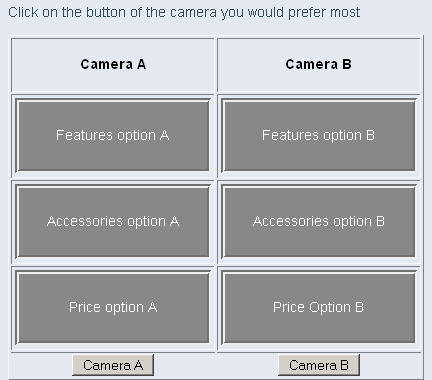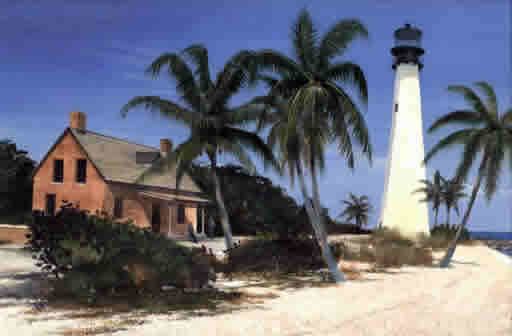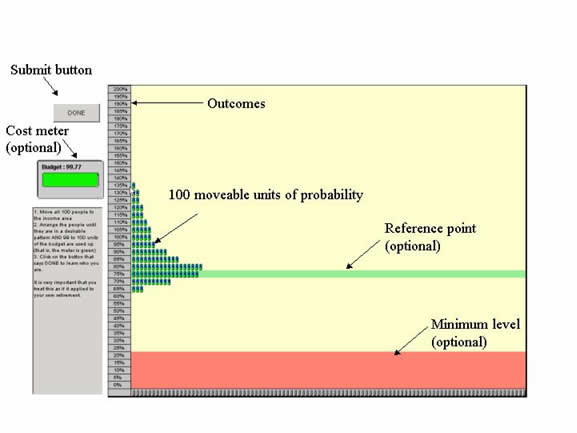« December 2005 | Main | February 2006 »
January 29, 2006
Want to get at what people are thinking?
MOUSELAB WEB

To download a video, click on the image (996Kb AVI).
Friends of DSN Eric Johnson and Martijn Willemsen have created an online version of the popular decision research tool MouseLab.
MouselabWEB is a process tracing tool that can be used to monitor the information acquisition process of decision makers on the web (and in the lab). It is derived from earlier work studying decision processes termed Mouselab (Johnson, Payne, Schkade, & Bettman, 1993).
The design philosophy behind MouselabWEB is to allow process tracing during ordinary web browsing. MouselabWEB uses technology already in the browser: dynamic HTML and Javascript. It works in all recent browsers, and therefore is operating system independent. The end user does not need to download plugins or other software and the pages are small enough to run experiments across a dialup phone connection. For the researcher, MouselabWEB offers a set of scripts to quickly setup and run experiments on the web. It uses mySQL and PHP (which is open source software supported by most hosting services) on the server side to save participant data, but can also used without this technology by using a form mailer that sends the data by email to the experimenter. Included in the package are webbased tools to create pages and manage data:
* A designer program to design pages with MouselabWEB and other questions
* A datalyser program to retrieve and replay a movie of the process data
MouselabWEB has already been used successfully to gather process data on the web, providing replications of well-known experimental results. It is open source (GNU/GPL license) and its developers encourage others to use it and help with development. For more information about MouselabWEB, visit: http://www.mouselabweb.org/
About the authors
Martijn Willemsen is assistant professor at Eindhoven University of Technology, The Netherlands. Together with Eric Johnson, he designed MouselabWEB during a one year visit as researcher at Columbia University. For more information, see his web site or send him an email.Web Page of Martijn Willemsen
Eric Johnson is professor in the Marketing division of the Columbia Business School, Columbia University, New York. For more information, see his web site or send him an email. Web Page of Eric Johnson
Posted by dggoldst at 06:02 AM | Comments (0)
January 25, 2006
One week until abtract deadline for Marketing Science
2006 INFORMS MARKETING SCIENCE CONFERENCE

The INFORMS Marketing Science Conference abstract deadline is February 1, 2006. Marketing Science is an annual conference that brings together the leading research scholars in marketing, and a small number of individuals from industry and government. The conference falls under the auspices of the INFORMS Society for Marketing Science (ISMS) sub-branch whose major purpose is to foster the development, dissemination, and implementation of knowledge, basic and applied research, and science and technologies that improve the understanding and practice of marketing. At the upper echelon of scholar-focused conferences in business, it is a forum where leading scholars in marketing present the results of their latest research.
The Marketing faculty of the University of Pittsburgh invites you to submit abstracts of your research papers, participate in the conference, and get a feel for the Pittsburgh community.
DSN has always been fond of Pittsburgh, PA, and the Carnegie Mellon Children's School, of which the DSN editor is an alumnus.
2006 INFORMS Marketing Science Conference Call for papers , Download pdf
The conference runs between the afternoon of Thursday, June 8, 2006, and the evening of Saturday, June 10, 2006. While parallel sessions are planned during the day, the evenings will consist of a reception (Thursday) and an awards dinner (Friday) and a potpourri of optional activities (Saturday). The venue is the Westin Convention Center Hotel in downtown Pittsburgh. Please make reservations at the Westin as Soon as possible.
Posted by dggoldst at 03:50 PM | Comments (0)
January 18, 2006
The 2006 North American Conference of the Association for Consumer Research
ACR 2006. ORLANDO. SEP 28-OCT 1. NO SUNDAY. DEADLINE: MARCH 17.

The 2006 North American Conference of the Association for Consumer Research will be held at the Renaissance Orlando Resort at Seaworld in Orlando, Florida, from Thursday September 28 through Sunday October 1, 2006.
As in past years, the conference will provide a multi-topical forum for scholarly presentations, discussions, and collaborations on consumer behavior. However, the format of this year's conference will be slightly different from previous years. The opening reception will take place on Thursday evening as usual. However, in a shift from previous ACR conferences, regular presentation sessions will take place only on Friday and Saturday, with Sunday being reserved for research meetings, informal discussion of sessions, etc. Please note Sunday is still an official scheduled conference day.
Additional specific information on submissions of special sessions, competitive papers, working papers, roundtables, and films is provided below.
PROGRAM STRUCTURE
As in the recent past, there will be five main forums for the presentation and discussion of research and scholarly thought.
Special Topic Sessions: provide opportunities for focused attention on cutting-edge and important topics. Successful sessions offer a coherent perspective on emerging substantive, theoretical, or methodological issues.
Competitive Paper Sessions: include papers that represent the completed work of their authors. The ACR conference co-chairs assign accepted papers to Conference sessions that reflect similar scholarly interests.
Working Paper Track: Participants typically present preliminary findings from the early stages of a research program. Authors distribute their papers and display their findings poster-style in a plenary session.
Roundtables: Encourage intensive participant discussion of consumer research topics and issues.
Film Festival: presents edited video recordings on topics related to consumer behavior. This year's Film Festival theme is "Making an Impact."
SUBMISSION AND DECISION DEADLINES
Submissions for competitive papers, working papers, roundtables, and special topic session proposals must be received no later than Friday March 17, 2006. Notification of acceptance in these four categories will be made by Friday July 14, 2006. The entry deadline for Film Festival submissions is Friday June 30, 2006. Notification of accepted films will be Monday July 31, 2006.
To give as many people as possible the opportunity to participate in ACR 2006, note the requirement that each ACR participant may present in Special Topic and/or Competitive Paper sessions no more than twice during the duration of the conference.
Posted by DSN at 07:08 PM | Comments (0)
January 16, 2006
Fast and frugal in Harvard Businses Review
A BRIEF HISTORY OF DECISION MAKING
The January 2006 Harvard Business Review provides a managerially oriented summary of the history of decision making, including the concept of "fast and frugal" reasoning, coined right here at Decision Science News.
Quote:
"The study of decision making, consequently, is a palimpsest of intellectual disciplines: mathematics, sociology, psychology, economics, and political science, to name a few. Philosophers ponder what our decisions say about ourselves and about our values; historians dissect the choices leaders make at critical junctures. Research into risk and organizational behavior springs from a more practical desire: to help managers achieve better outcomes. And while a good decision does not guarantee a good outcome, such pragmatism has paid off. A growing sophistication with managing risk, a nuanced understanding of human behavior, and advances in technology that support and mimic cognitive processes have improved decision making in many situations.
Even so, the history of decision-making strategies is not one of unalloyed progress toward perfect rationalism. In fact, over the years we have steadily been coming to terms with constraints--both contextual and psychological--on our ability to make optimal choices. Complex circumstances, limited time, and inadequate mental computational power reduce decision makers to a state of "bounded rationality," argues Simon. While Simon suggests that people would make economically rational decisions if only they could gather enough information, Daniel Kahneman and Amos Tversky identify factors that cause people to decide against their economic interest even when they know better. Antonio Damasio draws on work with brain-damaged patients to demonstrate that in the absence of emotion it is impossible to make any decisions at all. Erroneous framing, bounded awareness, excessive optimism: the debunking of Descartes's rational man threatens to swamp our confidence in our choices, with only improved technology acting as a kind of empirical breakwater.
Faced with the imperfectability of decision making, theorists have sought ways to achieve, if not optimal outcomes, at least acceptable ones. Gerd Gigerenzer urges us to make a virtue of our limited time and knowledge by mastering simple heuristics, an approach he calls "fast and frugal" reasoning. Amitai Etzioni proposes "humble decision making," an assortment of nonheroic tactics that include tentativeness, delay, and hedging. Some practitioners, meanwhile, have simply reverted to the old ways. Last April, a Japanese television equipment manufacturer turned over its $20 million art collection to Christie's when the auction house trounced archrival Sotheby's in a high-powered round of rock-paper-scissors, a game that may date back as far as Ming Dynasty China."
Source:
Buchanan, L., O'Connell, A., (2006). A brief history of decision making. Harvard Business Review, 84(1)
Posted by dggoldst at 06:27 AM | Comments (0)
January 11, 2006
What will the risk products of the future look like?
THE DISTRIBUTION BUILDER

To download a video, click on the image (6.7MB AVI).
The Distribution Builder is a tool that lets people specify the probability distributions of risk they would like to have apply to their own future. Think about using it to choose the outcomes you'd like to see from your investments, insurance policies, and medical procedures. Read about it here:
Goldstein, D. G., Johnson, E. J., & Sharpe, W. F. (working paper). Measuring Consumer Risk-Return Tradeoffs. Coming soon to a journal near you.
FAQs
Can I see a video of the Distribution Builder?
Yes, click on the image above to download.
Can I show a video of the Distribution Builder to my class?
Yes, this video may be used for non-commercial purposes, as detailed in the Creative Commons License on the main page of this site.
I need to gather distributions from people for an experiment I am running. Can the Distribution Builder do that?
Yes, the Distribution Builder can be used to elicit any kind of distribution, constrained or unconstrained.
I want to study people's preferences for two-alternative gambles, can the Builder do that?
Yes, the current Distribution Builder can display between 2 and 100 units of probability.
I want to have people create gambles they see as equivalent to other gambles, given constraints. Can it do that?
Yes, the Distribution Builder can be set such that any number of the markers are fixed in place.
Is the Distribution Builder publicly available?
We hope to make the basic GUI framework available in the future, with no promises as to when that will be. Watch this site for more information.
Posted by dggoldst at 11:28 AM | Comments (0)